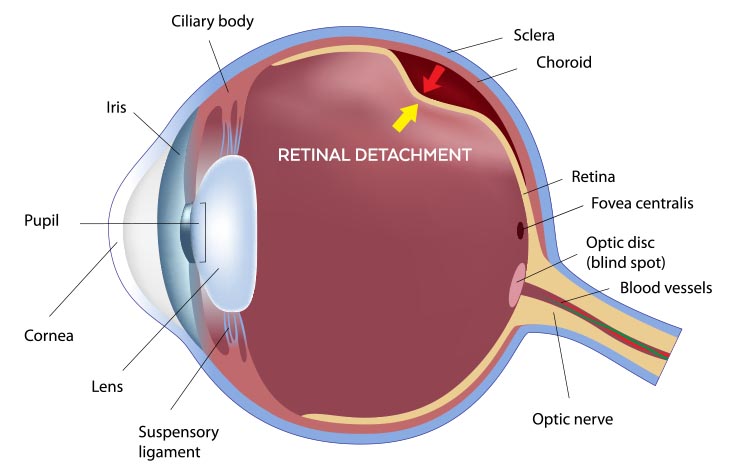Quite often, a detached retina can be preceded by a sudden increase in floaters, and the appearance of flashes in your vision. However, there are other causes for these symptoms, so there’s no need to panic when you do experience them. It is important for your eye to receive an examination by an eye specialist, to identify whether a detached retina caused these symptoms.

Retinal detachment can occur as a result of:
- Sagging or shrinkage of the jelly-like vitreous that fills the inside of your eye
- Injury to the Eye or Physical Trauma
- Advanced Diabetes
- An Inflammatory Disorder
- Aging
When the eye’s vitreous liquid (vitreous humor) leaks through a retinal hole or tear, and accumulates underneath the retina, retinal detachment can occur. Small retinal holes or tears can develop where the retina has thinned due to aging or with other retinal disorders. Retinal detachment due to a tear in the retina typically develops when there is a sudden separation of the vitreous from the retina. Less common is when fluid leaks directly underneath the retina, without a tear or break.
As liquid collects underneath it, the retina can peel away from the underlying layer of blood vessels (choroid). The areas where the retina is detached lose their blood supply and stop functioning, so you lose vision. When the retina is detached from the back of the eye, it cannot function. This means that when the retina is partially detached, there is a gap in the vision. But when it is fully detached, the affected eye is completely blind.
Aging is also related to retinal tears that lead to retinal detachment. As you age, your vitreous humor may change in consistency and shrink or become more liquid. Eventually, the vitreous may sag and separate from the surface of the retina — a common condition called posterior vitreous detachment (PVD), or vitreous collapse. As the vitreous separates or peels off the retina, it may tug on the retina with enough force to create a macular hole or retinal tear. Left untreated, the tear can progress to a retinal detachment. As you might suspect, PVD also causes visual symptoms. You may see flashes of sparkling lights (photopsia) when your eyes are closed, or when you’re in a darkened room. New or different floaters may appear in your field of vision.
The sooner a detached retina is treated, the better the chance of a good outcome. If you encounter any of the symptoms of a detached retina, please call our eye care clinic right away!